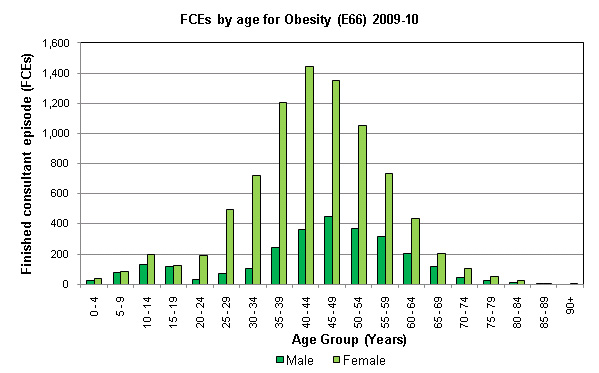IN THIS SITE...

- NHS Choices: Obesity
- ASO
- The IC Obesity Report
- Inpatient data
- Self Service
HES on... Obesity
Obesity affects people of all ages. This article gives an overview of the condition and highlights related 2009-10 Hospital Episodes Statistics (HES) data.
What is obesity?
The term 'obesity' is used to describe a situation where an individual is carrying too much body fat for their height and sex. A person is considered to be obese if they have a body mass index (BMI) of 30 or more.
Who does it affect?
According to NHS Choices, in 2008, the latest year with available figures, nearly a quarter of adults (over 16 years of age) in England were obese (had a BMI over 30). Just under a third of women, 32%, were overweight (a BMI of 25-30), and 42% of men were overweight.
Obesity affects everyone, from children through to adults (as shown in the graph below). HES data for 2009 - 10 shows that, in England, 30- to-59 year-olds are most likely to be treated in hospital with the condition.
 |
HES facts and figures
HES data for obesity (primary diagnosis code E66 in ICD-10) show that:
- Obesity was responsible for 11,173 episodes of treatment within hospital, accounting for 25,322 FCE bed days.
- of these, 7,392 (69.0%) of the hospital admissions for obesity were from waiting lists
- the average (mean) time that patients remained in hospital was 3.7 days
- the three most common procedures carried out on patients were:
- partitioning of stomach using band (G30, OPCS-4.5), accounting for 3,856 (36.0 %) FCEs relating to obesity
- other connection of stomach to jejunum (G33, OPCS-4.5), accounting for 1,491 (13.9%) FCEs relating to obesity
- connection of stomach to transposed jejunum (G32, OPCS-4.5), accounting for 1,166 (10.9%) FCEs relating to obesity.
More information on this topic is available from NHS Choices here.
Footnote:
1. Finished Consultant Episode (FCE)
A finished consultant episode (FCE) is a continuous period of admitted patient care under one consultant within one healthcare provider. FCEs are counted against the year in which they end. Figures do not represent the number of different patients, as a person may have more than one episode of care within the same stay in hospital or in different stays in the same year.
2. Finished admission episodes
A finished admission episode (FAE) is the first period of inpatient care under one consultant within one healthcare provider. FAEs are counted against the year in which the admission episode finishes. Admissions do not represent the number of inpatients, as a person may have more than one admission within the year.
3. Main procedure or intervention
The first recorded procedure or intervention in each episode, usually the most resource intensive procedure or intervention performed during the episode. It is appropriate to use main procedure when looking at admission details, (e.g. time waited), but a more complete count of episodes with a particular procedure is obtained by looking at the main and the secondary procedures.

